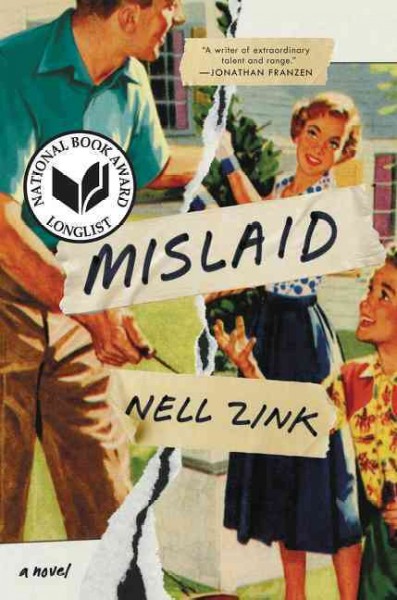 Books on Tap read Mislaid by Nell Zink at Champion Brewery on February 1. In this novel about identity, a young lesbian enters an women’s college in Virginia, marries her male poetry professor with whom she has two children, only to flee with their younger child to pass as black in rural southern Virginia. The family is reunited when the children cross paths at the University of Virginia. Zink uses a satirical, HBO-inspired tone throughout, although one of our readers felt it only developed later in the story. We all agreed that she is a clever writer, although many of the readers missed her literary references. For instance, the specifics of the “theater of the absurd” flew over most of our heads, but the phrase resonates on its own. Frequently, Zink rewards the reader who explores these references. In one case, it led one book group member to Paul Bowles’ Sheltering Sky.
Books on Tap read Mislaid by Nell Zink at Champion Brewery on February 1. In this novel about identity, a young lesbian enters an women’s college in Virginia, marries her male poetry professor with whom she has two children, only to flee with their younger child to pass as black in rural southern Virginia. The family is reunited when the children cross paths at the University of Virginia. Zink uses a satirical, HBO-inspired tone throughout, although one of our readers felt it only developed later in the story. We all agreed that she is a clever writer, although many of the readers missed her literary references. For instance, the specifics of the “theater of the absurd” flew over most of our heads, but the phrase resonates on its own. Frequently, Zink rewards the reader who explores these references. In one case, it led one book group member to Paul Bowles’ Sheltering Sky.
Peggy, aka Meg, would be the focal point of any movie adaptation. Somehow while raising two small children and later hiding out, she becomes well read. However, she is a terrible playwright (perhaps Zink’s own self-critique). She also sees herself at various points as a failed lesbian and mother. She often doesn’t measure up to the people around her. Their success seems to lie in exploiting others; her success is in the lives she builds.
Her daughter Mireille, aka Karen, is mostly a boring cipher, although the two year discrepancy between her real birthdate and that of her assumed identity muddles perceptions. We decided that the coldness in the relationship with her mother was due to the independence both need to cultivate while in hiding. Her best friend Temple is the most sympathetic, believable character. His struggles as a young black man from an impoverished school system set him up as a foil for Meg’s son Byrdie whose main talent, by virtue of being raised by his wealthy father’s family, is spending money well. The confidence of all three of the younger characters vary, but none of them is as pre-occupied with identity as their parents.
The group debated the believability of blonde, fair-skinned Meg and Karen passing for black. Would people naturally make that assumption or is Zink exaggerating for satirical effect? One reader wondered if Zink, who didn’t start publishing until her 50s, was inspired by former Spokane NAACP leader Rachel Dolezal . However, Meg and Karen aren’t alone for Lee is also always putting on an act. We then discussed the fact that the book isn’t really about its much-hyped premise of passing for black, but about race, sexual orientation and class differences.
The ending is incited by a drug bust at the University of Virginia, inspired by the real-life Operation Equinox. Here the tone shifts, becoming, according to some critics, Shakespearean. However, we concurred that the dialogue at end was terrible. This kind of absurdist, antic satire deserves a more unorthodox ending.
Was the novel as a whole satisfying? It provides no firm answers on identity and the ending is too pat. Zink favors social commentary over storytelling, making the book more of an intellectual experiment. Many of the episodes can stand alone as short stories, but we readers never knew where story was heading. However, we all admired Zink’s cleverness.
More Information:
About the author
Other works
Sheltering Sky by Paul Bowles
Books on Tap Information:
- Silver Sparrow by Tayari Jones (March 2) Need a copy of the book? Email Sarah shamfeldt@jmrl.org.
- The Cellist of Sarajevo by Steven Galloway (April 6)
Help us choose upcoming titles by adding to this list.